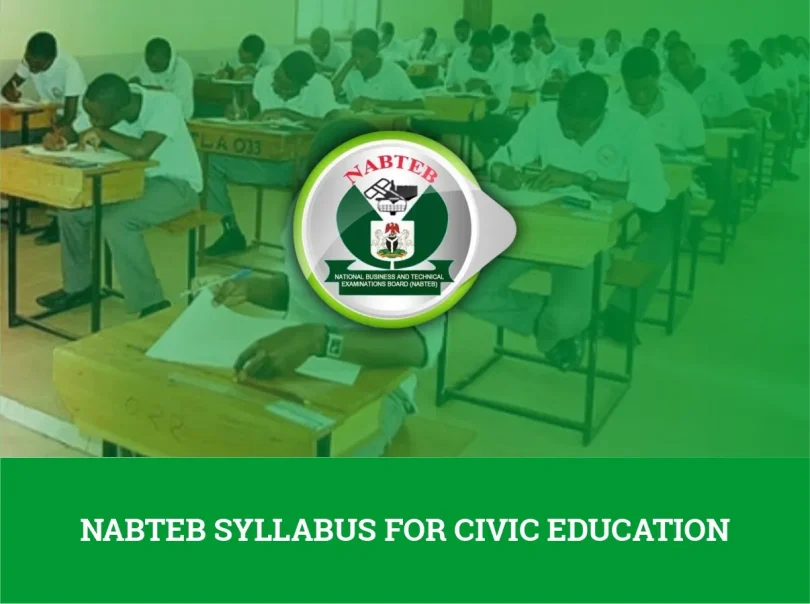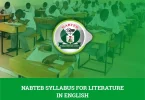As a student preparing to write the NABTEB exam in Civic Education, you need to understand what the course is all about. Civic Education is a subject that teaches young people how to become good citizens and also understand the society around them, how it works, what role to play in it, the role of government, and how they can make positive changes. Civic Education gives you real-life knowledge that helps you grow into a responsible citizen.
The National Business and Technical Examinations Board (NABTEB) includes Civic Education as a part of its syllabus to help students learn the knowledge, skills, and values needed to live responsibly and contribute to their communities.
In this article, we will break down the NABTEB syllabus for civic education, showing you what each topic entails to help you prepare well for your exams and life after school. Stay focused as we guide you!
Aims and Objectives of Civic Education
The main goals of this course are to help students:
- Understand how people, government, and society are connected.
- Learn how the government is structured and what responsibilities both the government and citizens have.
- Discuss current issues that affect society.
- Know their duties and responsibilities as citizens.
Examination Structure
The NABTEB Civic Education exam has two sections:
- Section A: 50 multiple-choice questions (1 hour), worth 50 marks.
- Section B: 6 essay questions (attempt 4), 1 hour 40 minutes, worth 60 marks.
NABTEB Syllabus for Civic Education 2025 (Summary of Key Topics )
Here is a breakdown of the major topics in the syllabus you need to study and understand, and prepare effectively to ace the examination:
1. Values
- Students should be able to know the meaning of values and what they are, as values like honesty, justice, and selflessness are important in everyday life.
- Students learn through real-life examples and community involvement.
2. HIV/AIDS
- Students learn what HIV/AIDS is, how it spreads, its effects, and how to prevent it.
- They also discuss how people living with HIV/AIDS should be treated with respect.
3. Youth Empowerment
- Young people are taught useful skills like communication, creativity, and problem-solving.
- These skills can help them build a better future.
4. Citizenship and Nationalism
- What does it mean to be a citizen?
- Rights and laws everyone must follow.
- How to be patriotic and solve civic problems.
5. Democracy and the Rule of Law
- Understanding how democracy works.
- Citizens’ freedoms and the importance of laws.
- Majority rule must respect the rights of minorities.
6. Constitution and Government
- Learn about the Constitution as the highest law.
- The roles of the government’s three arms.
- Citizens’ responsibilities and the role of political parties and the media.
7. Human Rights (UDHR)
- The Universal Declaration of Human Rights (UDHR) and the 7 core freedoms, like freedom from discrimination and fear.
8. Cultism
- Learn the dangers of cults, especially in schools.
- Reasons why people join, consequences, and how to stay safe.
9. Orderliness
- The importance of behaving in an organized and respectful way in society (e.g., queuing, driving properly).
10. Respect for Authority
- Learning about different authorities like teachers, parents, police, and the government.
- Why respecting rules helps society work better.
11. Importance of Citizenship Education
- Teaching young people about their culture, duties, and how to unite Nigeria.
12. Capitalist Democracy
- Understanding a government that supports free markets.
- Importance of elections, job creation, education, and healthcare.
13. Political Apathy
- Should understand when people don’t take part in politics, and why this is a problem.
- Encouraging young people to vote and speak up.
14. Popular Participation
- How can people take part in politics and community development?
- Barriers to participation and how to overcome them.
15. Human Rights and Limitations
- Understanding basic rights and when they can be limited (e.g., in emergencies or due to legal reasons).
16. Drug Abuse
- What drug abuse is, its effects, and how to prevent it.
- Role of agencies like NDLEA and NAFDAC in tackling drug problems.
17. Responsible Parenthood
- Good parenting leads to a better society.
- Parents should care, educate, and train their children well.
18. Traffic Regulations
- Rules that guide how people move on the roads.
- Importance of obeying signs and officials.
19. Interpersonal Relationships
- Relationships between people and how to maintain them using honesty, patience, and kindness.
20. Inter-communal Relationships
- Peaceful relations between communities and how to resolve conflicts through dialogue.
21. Human Rights Characteristics and Categories
- Human rights are for everyone, cannot be taken away, and include civil, political, economic, and environmental rights.
22. Fighting Political Apathy
- Ways to get more people involved in civic life: knowing your rights, joining organizations, and voting.
23. Public Service
- The role of public service in society.
- Problems like corruption and how to improve the system.
24. Civil Society and Participation
- Civil societies help protect citizens’ rights and promote democracy.
- Everyone should participate in building a better country.
25. Democracy and Rule of Law
- Importance of democracy and how laws keep society fair.
- Citizens must understand the law and take part in decision-making.
26. Human Trafficking
- Understand that selling or exploiting people is a serious crime.
- Causes, effects, and how the government and groups are fighting it.
Recommended Textbooks
To prepare for the NABTEB Civic Education exam, students can read:
- Pathfinder Global Civic Education by I. A. Adeoti
- Civic Education for SSS by Okunloye et al.
- Cosmopolitan Civic Education by Adeshola Olubunmi et al.
- Round-up Government by Ibiyemi Oyeleye et al.
- Rasmed Civic Education for SSS by Oyekunle Oyelami et al.
By following the information provided and the NABTEB syllabus for Civic Education, you will be sure of passing the exam without unnecessary stress. Civic Education is more than just a school subject for students, as it is about building a better Nigeria. When students understand their rights, responsibilities, and the way society works, they can make informed choices and become responsible leaders in the future.
If you are preparing for NABTEB or just want to know how to be a better citizen, this syllabus gives you all the tools you need. Ensure you share this information with your friends and study together and on time before the exams to pass. Feel free to reach out through the comment section below if you have any inquiries!







Leave a Comment